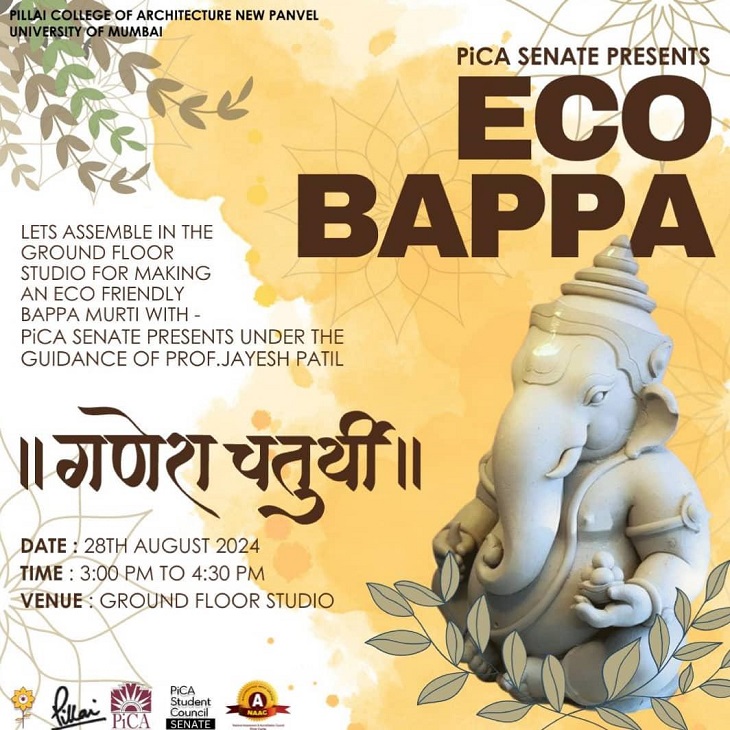| Event | PiCA Student Council Event |
| Session | 2024-25 |
| Year | II, III, IV, V |
| Date | 28th August, 2024 |
| Time | 3:00 p.m. onwards |
| Semester | III, V, VII, IX |
| In charge | Prof. Jayesh Patil, Prof. Ashwini Bhosale |
| Coordinators | Rudrani Gondhali, Shrutika Patil |
The Eco Bappa Workshop, held on the 28th August, 2024, was a highly engaging and meaningful event organized by the Student Council. The workshop took place at the Ground Floor Studio and saw active participation from students across various years, faculty members, and non-teaching staff from PICA.
Objective:
The primary aim of the workshop was to promote eco-friendly practices by encouraging the creation of Ganesh idols (Murti) using eco-friendly Shadu clay. This initiative aligns with the increasing awareness and responsibility towards environmental conservation, especially during the Ganesh Chaturthi festival.
Guidance:
Under the expert guidance of Prof. Jayesh Patil, a respected faculty member of PICA, participants were instructed in the art of making ECOBAPPA Murtis. Prof. Patil provided valuable insights into the traditional methods of sculpting with Shadu clay while emphasizing the importance of using sustainable materials to reduce environmental impact.
Workshop Activities:
Introduction: The workshop began with an introduction to the significance of using Shadu clay, an eco-friendly material, for idol-making. Prof. Patil explained the environmental hazards posed by conventional Plaster of Paris (PoP) idols and how Shadu clay serves as a better alternative.
Demonstration: Prof. Patil conducted a live demonstration, showing participants the step-by-step process of sculpting a Ganesh idol. The demonstration covered key techniques, from molding the basic structure to adding intricate details.
Hands-on Session: Participants were then provided with Shadu clay and other necessary tools to create their own Ganesh idols. Prof. Patil, along with other faculty members, offered personalized guidance and assistance throughout the hands-on session.
Discussion: The workshop concluded with an interactive session where participants discussed the challenges and joys of working with eco-friendly materials. There was also a reflection on the broader impact of such practices on the environment and society.
Outcome:
The ECOBAPPA workshop was a resounding success, with participants creating beautiful, eco-friendly Ganesh idols. The event fostered a sense of community and environmental responsibility among students and staff alike. It also reinforced the importance of sustainable practices in cultural celebrations.
The Student Council’s initiative to host the Eco Bappa Workshop was well-received by all attendees. The event not only provided a platform for creative expression but also served as a reminder of our collective responsibility towards preserving the environment. Such workshops are essential in promoting eco-consciousness among the younger generation, ensuring that traditional practices can coexist harmoniously with environmental stewardship.









